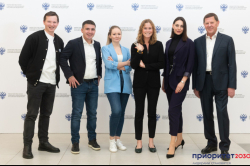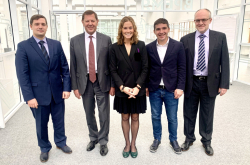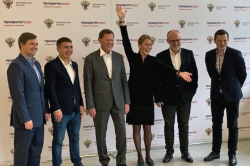New objectives, new experts
This year, the Supervisory Council welcomed new experts: Pavel Voronin, MTS’ senior vice president for technologies, Vitaly Zadoroznhy, the director for information technologies and senior vice president at Alfa-Bank, Natalia Popova, the first deputy general director at Innopraktika, and Edward Tiktinsky, the CEO of RBI holding, as well as Olga Petrova, the Deputy Minister of Science and Higher Education, and Vitaly Grishkin, the director of the Educational Organizations Coordination Department at the Ministry of Science and Higher Education.
“We see the Supervisory Council as the source of the highest expertise, which is why we value the experts’ feedback on our development strategy and insights on reaching its three key objectives. First, we aim to turn ITMO into a talent-centric corporation, attracting gifted lecturers and students. Second, we want to envision an educational model that will help us train technological leaders capable of creating new products in AI, quantum technologies, robotics, chemistry, and biochemistry. And third, we strive to advance from a university to a research and technological corporation introducing new products on the market,” commented Daria Kozlova, ITMO’s Director for Strategic Development.
Also present at the session were permanent members of the Supervisory Council: Alexander Krainov, the director for development of artificial intelligence technologies at Yandex and Elena Fedorova, the head of the Interregional Territorial Administration of the Federal Agency for State Property Management in St. Petersburg and the Leningrad Oblast. The invited experts were Olga Filatova, an independent member of the board of directors at HeadHunter, and Ilya Dementiev, the Rector of Gazprom Neft’s corporate university. The meeting was presided by Sergei Kulikov, the chairman of the board at RUSNANO.
Becoming a talent-centric corporation
One of the objectives of the new development strategy is to attract talented lecturers to ITMO. Universities usually compete for the best specialists with the industry and don’t always win in this battle. According to Daria Kozlova, ITMO has turned this competition into collaboration. Now, the university implements over 15 educational programs with tech corporations, including Yandex, VK, Sberbank, Samolet, Gazprom Neft, and YADRO, while 90% of lecturers at the university’s IT programs are practicing specialists.
However, fundamental training starts not at university, but earlier – at schools. Thus, ITMO implements continuous professional development programs for school teachers; this year, they will welcome 200 attendees. Students with scientific, social, or engineering projects, as well as startups, can apply to the university via the competition ITMO.STARS. The university also hosts winter and summer schools and competitions in natural sciences, annually attended by around 100,000 school students. Last year, the university welcomed a record number of school contest winners, 685 students from all over Russia, while the average applicant Unified State Exam score reached 94.15.
Nevertheless, St. Petersburg currently can’t boast a great number of winners or runners-up in the national competition in IT, physics, chemistry, and astronomy. This year, in collaboration with the city’s administration, ITMO aims to create a new system for training competition participants at St. Petersburg’s youth centers in order to increase the city’s representation at national competitions.
“In order to reach this goal, ITMO needs to develop deeper connections with local schools, including through partnership with schools specializing in related subjects, collaborating with teachers, and clear communication,” said Edward Tiktinsky.

Edward Tiktinsky. Photo by Dmitry Grigoryev / ITMO NEWS
Training tech leaders
How can the education system be adapted to enable teachers and students to use AI in their daily activities while critically evaluating its outputs? Currently, ITMO implements 23 educational programs in AI for students and has conducted one course for 155 lecturers on using AI in educational products in collaboration with Alfa-Bank.
ITMO will bank on AI as a part of the academic process, collaborating with industrial partners on an AI assistant to lecturers and an AI copilot for students.
“It’s also important to organize the academic process in a way to enable students to teach themselves and their lecturers to use AI in education. These days, new tools appear every week, making conventional teaching approaches redundant. If a lecture were to be made on the topic, it would probably be obsolete by the time it’s delivered. That’s why we need to create an environment where students will be able to exchange the knowledge that’s relevant at the moment,” added Alexander Krainov.

Ilya Dementiev and Alexander Krainov. Photo by Dmitry Grigoryev / ITMO NEWS
Who is an ideal ITMO graduate? According to Daria Kozlova, it’s someone who combines fundamental knowledge and practical skills in their studies, may work alongside their studies, and after graduation can instantly adapt to their workplace at a company working in one of the university’s priority fields. Importantly, more than 30% of graduates can expect to land a position above entry level. How can we evaluate if the university’s actual graduates are close to this vision?
“There are two indicators to track in this case. First, if graduates find employment within their specialization. If we aim to train specialists and PIs – and then our graduates actually work in these fields, it’s wonderful. Another indicator to track is which of the leading companies employ our graduates. Yet another possible indicator is the number of joint programs between the university and the industry; in such programs, students learn about a company’s inner structure, intern there, and contribute to a real-world product. Such programs increase student employability within their field and boost their careers,” said Olga Filatova.

ITMO's Supervisory Council. Photo by Dmitry Grigoryev / ITMO NEWS
A research and technological corporation
At ITMO, education is built on a product- and project-oriented approach: in teams, students generate and validate technological ideas and then defend their startups as theses. They can also develop their ideas at ITMO Accelerator that currently supports 329 startups in collaboration with seven major venture funds. What steps should the university take to become a research and technological corporation and to learn to interact with the market and introduce new products developed with its partners?
One option will be an investment fund for ITMO Family members and partners. According to Andrey Anfinogenov, the Dean of ITMO’s Faculty of Technological Management and Innovations, the fund would support the startups developed by students and heads of projects.
“For the university, it’s important to support many student startups and have an investment fund that will support them. Young entrepreneurs need to understand that they can find a friendly and qualified investor in the form of ITMO’s fund and potential technological partners,” shared Edward Tiktinsky.
One project that can potentially be supported by ITMO’s investment fund is the development of ProAGI, a kind of AI capable of learning on its own, adapting to unfamiliar situations, and solving any cognitive tasks within the range of human capacity. Based on ProAGI, ITMO researchers can use any products on demand, such as a digital twin for innovation evaluation in manufacturing or a digital avatar of an employee. Earlier, ITMO scientists already unveiled ChemCoScientist, a digital assistant to chemists that can generate new compounds and synthesis algorithms – or improve the existing ones, predict chemical properties, and extract knowledge from research papers.

Vitaly Zadorozhny. Photo by Dmitry Grigoryev / ITMO NEWS
According to Vitaly Zadorozhny, ITMO should focus on its strengths and commercialize them. The university trains qualified specialists who can come up with breakthrough ideas for the industry, develop them into MVPs, and sell them.
ITMO can combine its expertise in teaching and developing AI products to create AI assistants for students and lecturers, replicating this technology at educational institutions all over the country, agreed Pavel Voronin.







